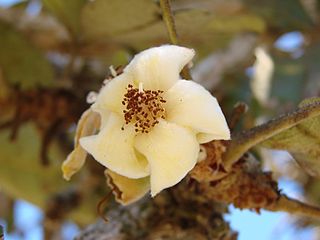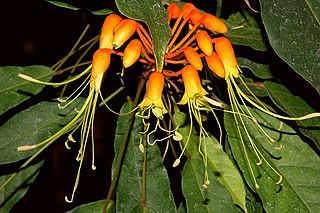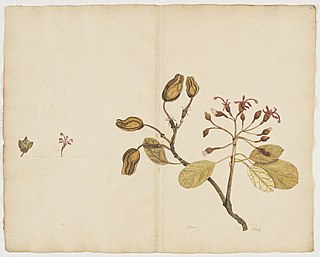
The Santalaceae, sandalwoods, are a widely distributed family of flowering plants which, like other members of Santalales, are partially parasitic on other plants. Its flowers are bisexual or, by abortion, unisexual. Modern treatments of the Santalaceae include the family Viscaceae (mistletoes), previously considered distinct.

Myrtaceae, the myrtle family, is a family of dicotyledonous plants placed within the order Myrtales. Myrtle, pōhutukawa, bay rum tree, clove, guava, acca (feijoa), allspice, and eucalyptus are some notable members of this group. All species are woody, contain essential oils, and have flower parts in multiples of four or five. The leaves are evergreen, alternate to mostly opposite, simple, and usually entire. The flowers have a base number of five petals, though in several genera, the petals are minute or absent. The stamens are usually very conspicuous, brightly coloured, and numerous.

Heinrich Wilhelm Schott was an Austrian botanist. He is known for his extensive work on aroids (Araceae).
Sterculiaceae was a family of flowering plant based on the genus Sterculia. Genera formerly included in Sterculiaceae are now placed in the family Malvaceae, in the subfamilies: Byttnerioideae, Dombeyoideae, Helicteroideae and Sterculioideae.

The Balanophoraceae are a subtropical to tropical family of obligate parasitic flowering plants, notable for their unusual development and formerly obscure affinities. In the broadest circumscription, the family consists of 16 genera. Alternatively, three genera may be split off into the segregate family Mystropetalaceae.

Cleome is a genus of flowering plants in the family Cleomaceae, commonly known as spider flowers, spider plants, spider weeds, or bee plants. Previously, it had been placed in the family Capparaceae, until DNA studies found the Cleomaceae genera to be more closely related to the Brassicaceae than the Capparaceae. Cleome and clammyweed can sometimes be confused.

Eriotheca is a genus of flowering plant in the mallow family (Malvaceae) and found in tropical South America.

Steriphoma is a genus of flowering plant in family Capparaceae. It contains 11 species of which only 5 are accepted:

Franz Joseph Andreas Nicolaus Unger was an Austrian botanist, paleontologist and plant physiologist.

Pterygota is a genus of flowering plants in the family Malvaceae.

Helicteres is a genus of flowering plants in the family Malvaceae. Its range is from tropical and sub-tropical Asia through to northern Australia, and also Mexico through to the northern half of South America.

Ungeria is a monotypic genus of flowering plants belonging to the family Malvaceae. It just contains one species, Ungeria floribundaSchott & Endl. It is also in the Helicteroideae subfamily and Helictereae tribe.

Thaumatophyllum is a genus of flowering plants in the arum family, Araceae. Its species are native to northern (tropical) South America.

Comesperma integerrimum is a twining shrub or climber in the family Polygalaceae.
Antidaphne is a genus of flowering plants belonging to the family Santalaceae.

Coussapoa is a genus of flowering plants belonging to the family Urticaceae.

Lophophytum is a genus of flowering plants belonging to the family Balanophoraceae.

Zanthoxyloideae is a subfamily of the family Rutaceae.
















